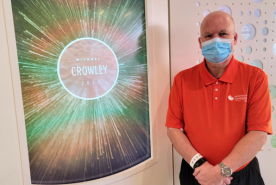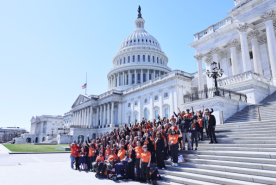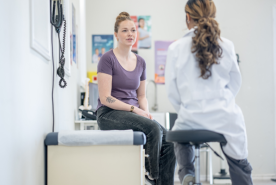Health systems, social systems, and environmental factors Organ and tissue transplantation and donation Healthcare quality, access, and evaluation
November 13, 2019
Are there at least three people in the room where you’re sitting right now? Then statistically speaking, you may be sitting next to at least one person at risk of kidney disease or, it could be you. And, if you have diabetes, your risk goes up for this life-threatening condition.
Yet, most Americans know nothing about kidney disease, even those people who already have diabetes or kidney disease. A new Harris Poll released this month confirmed the shocking statistic.
Forty-six of responders in the poll, some who have been diagnosed with diabetes, didn’t know that diabetes increases risk of kidney failure, and nearly one third aren’t aware it also puts a person at greater risk of kidney disease. According to the Centers for Disease Control and Prevention, about 90 percent of all American adults who have kidney disease don’t know they have it.
It’s time to know if you’re at risk.
What is kidney disease?
Kidney disease means your kidneys are damaged and losing their ability to keep you healthy. It causes more deaths than breast cancer or prostate cancer and is a public health crisis in America. It affects an estimated 37 million people in the U.S., an alarming number that has been rising for decades.
In the early stages of the disease, most people don’t have symptoms. But as it gets worse, waste builds up in your blood and makes you feel sick. You may develop other problems too, like high blood pressure, anemia, weak bones, poor nutritional health, and nerve damage. While these problems may happen slowly and without symptoms, kidney disease can lead to kidney failure, which can strike without warning.
Once a person’s kidneys fail, he or she will eventually need dialysis or a kidney transplant to stay alive.
Know the risks
Since kidney disease usually starts with silent symptoms, it is important to know the risks. If you have any of these conditions, you should talk to your primary care physician about kidney health:
- Diabetes, Type 1 or Type 2
- High Blood Pressure
- Heart Disease
- Family history of kidney disease
- Obesity
Kidney disease is also more common among African Americans, Hispanic Americans, Asians, Pacific Islanders, and American Indians than White Americans. Age matters, too. If you are more than 60 years old, you are at increased risk.
Kidney disease has many causes but knowing your risk can guide you in your discussions with your primary care physician.
Harris Poll: Too many are in the dark
The Harris Poll asked two questions in the online survey of 2,050 American adults. First, the responders were asked to list their conditions diagnosed by a medical professional and then they were asked whether there is an increased risk for kidney disease if a person has diabetes.
Nearly 3 in 10 Americans, including more than 1 in 10 who already have been diagnosed with diabetes by a medical professional, didn’t know that diabetes increases the risk of kidney disease.
This survey was conducted online within the U.S. between October 23-25, 2019, and among the respondents, included 290 people who have been diagnosed with diabetes by a medical professional.
More results from the Harris Poll
- Men at higher risk: Men are more likely than women to be diagnosed with diabetes by a medical professional (17 percent vs. 10 percent).
- Income matters: Americans with an annual household income of less than $50,000 are more likely than those with an annual household income of $50,000 or more to have ever been diagnosed with Type 2 diabetes (14 percent vs. 8 percent).
- Wisdom comes with age: Younger adults (ages 18-34) are more likely than their older counterparts to answer incorrectly or not be sure about the risk of kidney disease associated with diabetes. (40 percent vs. 24 percent of those ages 35 and up.)
The Harris Poll, conducted for the National Kidney Foundation, was made possible through sponsorship funding by Otsuka Pharmaceutical.
Are there symptoms?
Most people do not have any severe symptoms or signs that they have kidney disease until the condition gets worse. While the best way to know if you have kidney disease is to get tested, you may:
- feel more tired than usual
- have less energy
- have trouble thinking clearly
- have a poor appetite
- have trouble sleeping
- have dry, itchy skin
- have muscle cramping at night
- have swollen feet and ankles
- have puffiness around your eyes, especially in the morning
- need to urinate more often, especially at night
What should you do?
If you fall into any of the risk categories, you should talk to your primary care physician about getting tested annually for kidney disease. Two simple tests, one common blood test and urine test, can help determine if you have kidney disease.
Talk to your doctor about having the “Kidney Profile,” the laboratory name of the tests that measure the estimated glomerular filtration rate (eGFR) in the blood and levels of albumin in the urine, known as the urine albumin to-creatinine ratio (UACR).
This combination of eGFR and UACR testing has been shown to be a strong predictor of kidney failure risk.
You can also speak to a registered dietitian nutritionist (RDN) about eating a diet that can help maintain your kidney health and maybe even slow progression of kidney disease.
Why does this matter?
Kidney disease can be deadly. There are five stages of kidney disease, and during the very last stage, the kidneys completely fail to properly filter waste from the body. No one can live for long with kidney failure. Someone with kidney failure must either have dialysis or a kidney transplant to stay alive.
In 2016, more than a half a million American adults received dialysis and more than 200,000 people lived with a kidney transplant. Today, there are about 100,000 people waiting for a kidney transplant. Dialysis is not an easy treatment for patients and most Americans on dialysis must travel to a center several times a week to be hooked up to a machine for 3-4 hours to clean their blood. Tragically, 12 people on average die every day waiting for a kidney transplant.
Kidney disease costs America billions of dollars every year. In 2018, $114 billion in Medicare funds were spent on kidney disease and end-stage kidney disease, according to the U.S. Renal Data System.
Early awareness and detection are the keys to helping curb these sobering numbers.
What is NKF doing about it?
The National Kidney Foundation’s vision is to:
- eliminate all preventable kidney disease
- make transplants available for all patients who want one
- and relentlessly advocate for a better quality of life and outcomes for all kidney patients
What can you to do right now?
- Take the NKF Kidney Health Assessment
- Find a free health-check near you.
- Make a doctor’s appointment.

















